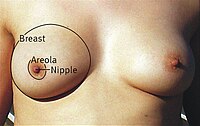
Photo from wikipedia
S chifferdecker et al. 1 conducted a qualitative analysis of 443 focus group excerpts from 47 women with a normal mammogram and dense breasts to explore the women’s reasons for… Click to show full abstract
S chifferdecker et al. 1 conducted a qualitative analysis of 443 focus group excerpts from 47 women with a normal mammogram and dense breasts to explore the women’s reasons for undergoing breast cancer screening, their knowledge of breast cancer risk factors, the information they received about and knowledge of breast density, and experiences and questions about supplemental imaging. About half of all women knew that they had dense breasts, but most had limited knowledge of what this meant. Most of the women desired more information on breast density and its implications for screening. Investigators concluded that insufficient understanding of risks, benefits, and potential harms of supplemental screening exists. Breast cancer screening is complicated for both clinicians and their patients. A variety of organizations have developed screening guidelines that differ in specifics and often fail to discuss supplemental screening strategies. Clinicians may overestimate their patients’ understanding of their own health risks. Even well-educated individuals can face health literacy issues when they are not familiar with medical terminology or with the benefits and risks of various diagnostic tests. In 2008, Cavanaugh et al. provided a striking example. More than half of diabetic outpatients could not understand titration instructions for long-acting insulin, and a quarter could not identify which blood glucose values were within their target range. Poor numeracy skills were associated with worse perceived self-efficacy and fewer self-management behaviors. Results of this qualitative study of breast cancer screening suggest that the same could apply to breast cancer screening and breast density. Increased breast density is an independent risk factor for breast cancer. About half of the 47 participants knew that they had dense breasts, and only one was aware that it was a risk factor for cancer. Living in a state with breast density notification laws appeared to have little impact on this knowledge. Further qualitative research on breast cancer screening can help better understand patients’ knowledge and experiences as they undergo cancer screening, target ways in which the screening process can be improved, and perhaps improve efficacy of this health intervention.
Journal Title: Journal of General Internal Medicine
Year Published: 2020
Link to full text (if available)
Share on Social Media: Sign Up to like & get
recommendations!